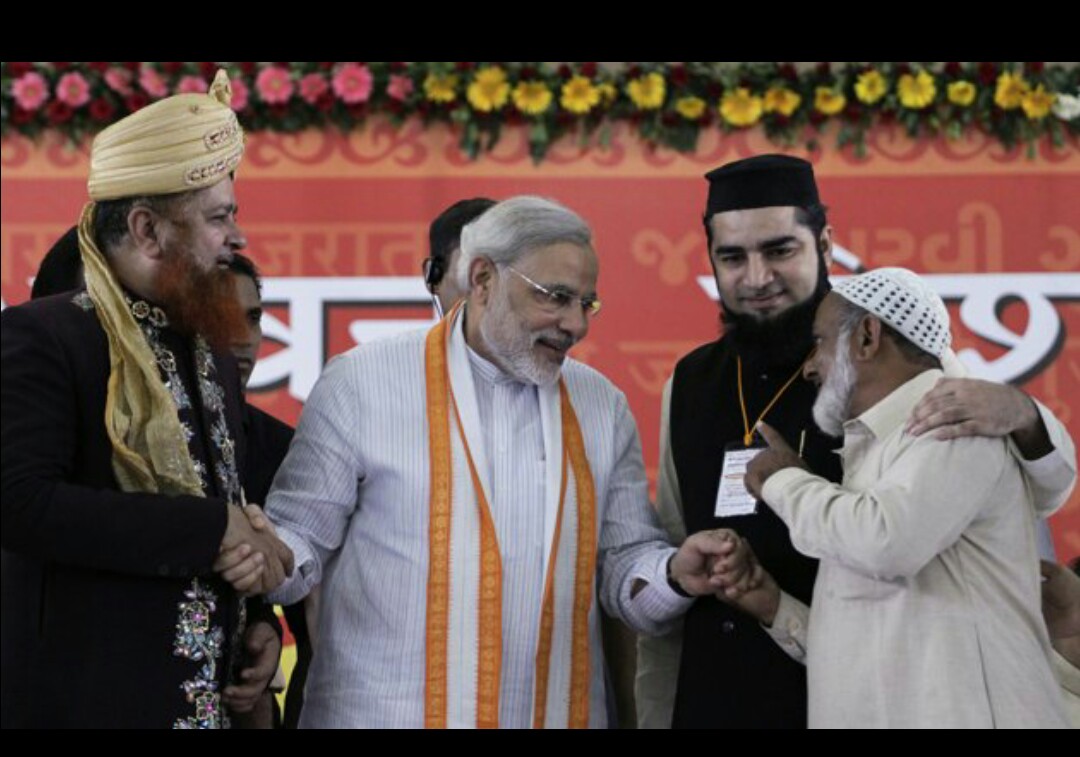Are Indian Muslims Afraid Of Modi?
Who is afraid of PM Modi?
“Modi may be absolved by one judge but there were numerous charges that were not pressed. Muslims are scared of Modi though many well-placed Muslims have joined him,’ Nobel Laureate Amartya Sen had audaciously stated in the past.
How true is it?
After the overwhelming election results of 2014, endowing a mind-boggling victory to BJP, are the Muslims in India living in uncertainty, fear and marginalization? Howsoever tactically, Narendra Modi has been smart enough to have largely avoided invoking communally divisive issues at least in this election campaign, and has rather preferred to talk of ‘development’, the statistical fact of which is of course contested by his opponents.
Nevertheless, Modi has a stain he would want to wash. He wouldn’t like Gujarat 2002 to be the overwhelming theme of his legacy. From his speeches and revised idioms, one can sense the desire to be bipartisan and just. After all, Modi secured the strongest mandate of any Indian leader for 30 years, after the BJP won 282 seats, dominating even in states with large Muslim populations such as Uttar Pradesh and Maharashtra.
But while Modi has stressed inclusiveness and development, his top aide Amit Shah was briefly banned from campaigning for inflammatory comments seen as a bid to polarise voters along religious lines. Subramanian Swamy, a senior BJP leader from the southern state of Tamil Nadu, declared in a speech that mosques, unlike temples, are not holy places and thus can be demolished.
But quite frankly, intermittent communal violence, some contentious issues like Uniform Civil Code, Article 370, beef ban in Maharashtra, love jihad and ghar wapsi as well as the atrocious Dadri lynching episode reveal the communal polarization witnessed by India. Sakshi Maharaj, a lawmaker from the ruling Hindu nationalist Bharatiya Janata Party (BJP), said that Hindu women must have at least four children each to keep up with the growth in the population of Muslims in India.
“What scares Muslims is essentially that they are convinced that this is a person who doesn’t have much respect for them, for their lives and for their future,” says Mujibur Rehman of the Centre for Minority Studies at Delhi’s Jamia Millia Islamia University. At the same time, the intellectual community made of popular protagonists like Salman Rushdie, Homi Bhabha, Anish Kapoor, Deepa Mehta have been voicing against the creation of a narrative of Hindu Rashtra.
Modi, not uniquely among powerful Indian politicians, has little appetite for dissent. Then in 2002, Darshan Desai, an Indian Express reporter first tracked down Jashodaben in her village, not only did she refuse to talk to him, as soon as he got home, he got a call from Modi himself.
He said ‘Namaskar’, and then he asked: ‘So what is the agenda?’
“I said, ‘I didn’t quite get you.’ And he said, ‘You have written against me. Your newspaper even started Modi Meter,’ referring to a column my paper ran during the riots. I just kept quiet, and he said, ‘I’m aware what you’ve been up to today. What you’ve done today goes much beyond. That’s why I want to know what your agenda is.’
The chilling effect already extends beyond Gujarat.
Accusing the Narendra Modi government of not taking action against “Hindu forces spitting communal venom”, the All India Muslim Personal Law Board passed a resolution to launch a campaign appealing Muslims and minorities to rise against such forces. The board also passed a resolution against making Surya Namaskar and yoga compulsory in government schools in Rajasthan, Haryana, and Madhya Pradesh.
So, is it wrong to experience fear against Modi government? It is an appropriate, hard-wired response to danger. Without fear—the “fight or flight” instinct—we humans would have long since disappeared from the earth. And if our political leaders don’t acknowledge that the citizenry is afraid, if they dismiss such an emotion as unworthy, they are much less likely to be trusted when they propose what to do.
Modi has conducted himself with remarkable circumspection, reassuring Muslims and other minorities about their place in Indian society, avoiding loaded or ambivalent language, and building bridges with Pakistan. He has not, however, tried to stop BJP state governments from pursuing a more nationalist agenda or has done much to curb inflammatory rhetoric.
Aroon Purie, the editor of India Today newsmagazine and one of the country’s foremost journalists, recently wrote, “The way to govern this complicated country is to engage in discussions and win arguments with those who disagree” rather than “squashing dissent” and orchestrating a cult of personality.”
Indian Muslims, like African-Americans in the United States, are marginalized members of a culture they have done so much to shape. The Sachar Committee, which studied the condition of Muslims nationwide, reported in 2006 that “Muslims complained that they are constantly looked upon with a great degree of suspicion not only by certain sections of society but also by public institutions and governance structures.”
But fortunately, the political situation in India is not as sensitive as it is in West Asia, Balkans or even Pakistan. Even now, few Muslim populations are assured that however vulnerable their position in India, the political system will protect them from the worst. They are trying hard to adhere and trust Modi’s development agenda.
But the question is: For how long and to what degree?
(The writer is a doctoral student at JNU, New Delhi).





